Join Us!
To stay up-to date on the latest Art Terms news,artworks, artists and exclusive offers. Sign up now
[INTERVIEW] Interview with Simone Florell
July 2, 2021
By Rebecca Armitage
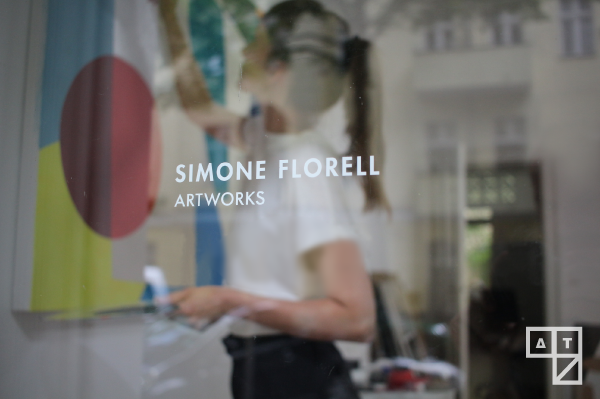
Photo Credit: Wanja Scholz
Hello Simone. Could you introduce yourself to the Art Terms Magazine readers?
I'm Simone and I live and work in Berlin. I create abstract paintings, love the peace and quiet in my studio in Schöneberg and the bustling life surrounding it.
Have you had a decisive moment to become an artist?
Having children can bring you to (at times involuntary) deep learnings about yourself. Understanding where I'm coming from has helped me create a healthier worklife for myself. About 4 years ago there was the realization that I wanted complete autonomy in my work. Independent and selfdetermined work is key for my creative flow, self- expression, personality and overall well-being. That's when passion turned into profession.
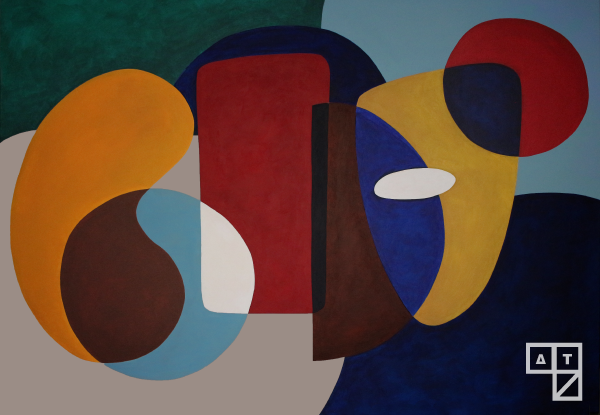
"Transition # 2", acrylic on canvas, 2021
What is your source of inspiration?
I love podcasts, exchanges and books that revolve around our human Stone Age brains clashing with modern life structures. Sociological, societal megatrends, our brain's hard wirings – endlessly inspiring material to me. On a lighter note Berlin's numerous exhibition venues, trips to the country side and the morning bike ride to my studio.
The organic shape and harmonious color arrangement are impressive. Could you briefly explain to us the process of making your works?
Thank you. : ) The process starts as an observation or a mood and flows onto paper as a draft, drawing shapes and experimenting with colour compositions. I aspire my colours to have a liveliness yet an ease to them, so I love mixing shades. When in the actual painting stage, some elements gradually disappear under new ones, yet they are there, giving the works their characteristical layers. When the rhythm of the painting feels right, it’s complete.
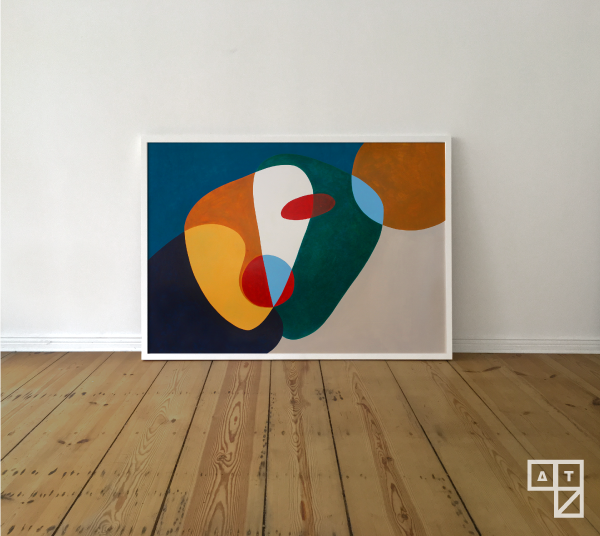
Recon # 4", acrylic on paper, 2021
You introduced yourself like “creating abstract paintings as an examination of social structures and human relationships with all their fragilities, dynamics, reciprocity and correlations.” Could you explain how you came up with expressing human relationships and social structures as the organic shape (abstract painting)?
For me the organic form functions as an equivalent for everything that is dynamic and imperfect - like us humans and our social systems. I find these and us are constantly changing, adapting, morphing and adjusting.
Is there any meanings of each color and form?
The overlap of these forms and the new colors that emerge from it equal for me the repercussions and the new and unexpected that can arise from our encounters.
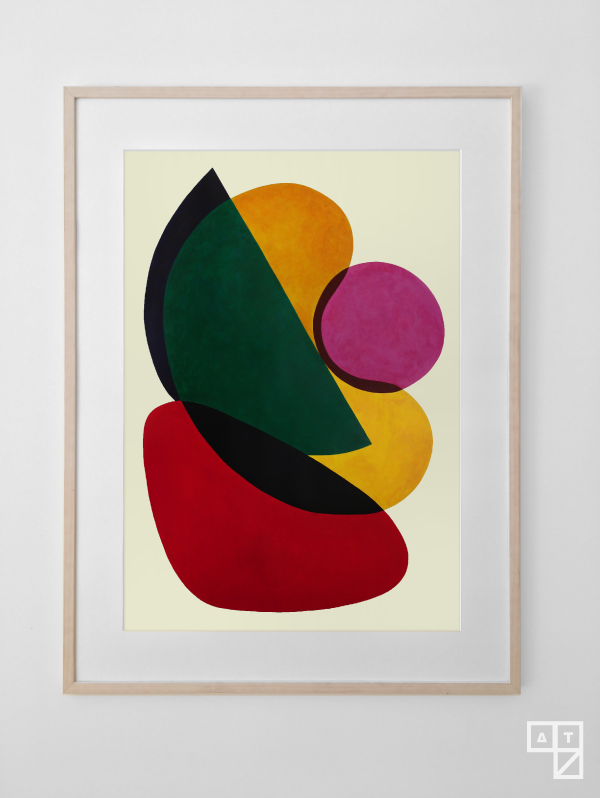
"Isomorph # 4", acrylic on paper, 2021
What’s the essence of your artwork?
Observation, optimism and wondrousness.
Who is your favorite artist and why?
Sophie Calle with her relentless studies, Louise Bourgeois’ determination and eeriness and Jessica Walsh for her fearlessness and experimentation.
What is your favorite comment or critique you’ve received about your work?
My six-year-old son said the other day, "You should have a contest with your pictures. I would vote for you. You make beautiful pictures.“ I’ll go with this one for now.
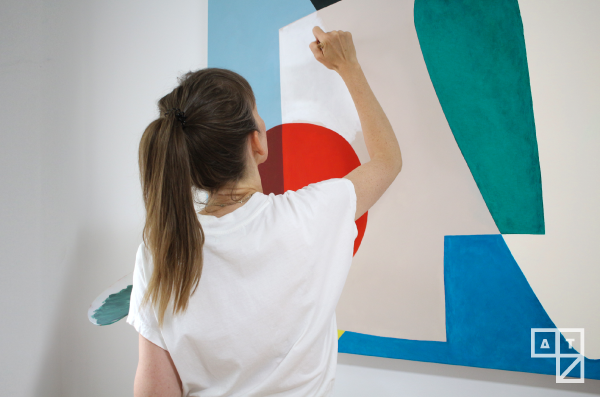
Photo Credit: Wanja Scholz
Is there one particular artwork you’ve created that you’re most proud of or close to? Why’s that?
There is not one, but there are a couple, yes. Sometimes it's just the context in which a piece was created or it’s a technique of painting and composition that stands out to me. But so far, I've let all these pieces free and out into the world.
What was the most difficult experience while creating amazing artworks?
The slowness and the lack of cmd + Z. As someone who has always worked on the computer in fast-paced work environments, it's still amazing to me how lengthy analog real-time can feel like when painting. It's unforgiving of mistakes, you have to know what you're doing. Nothing goes by the way side, focus is key. A humbling experience, at the same time I am very grateful that I can allow myself to take this time in my work.
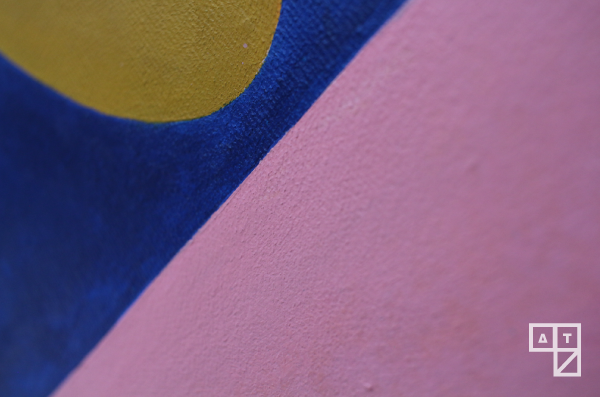
Detail of acrylic on canvas
What is the most important detail or point you consider the most (when creating artworks)?
With each work I want to bring in a new element, just to keep myself on my toes. Either I try a completely different color, a modified technique, a new background or a larger format. Sometimes more, sometimes less subtle things, but for me it makes it a learning experience every time.
Do you remember when your artwork was first sold? How was it like?
Having sold my first work felt exciting and unreal. There is someone out there for whom my work means so much that they want to be surrounded by it continuously. Even to this day, I can't fully grasp it. Which maybe is rather a good thing, though.
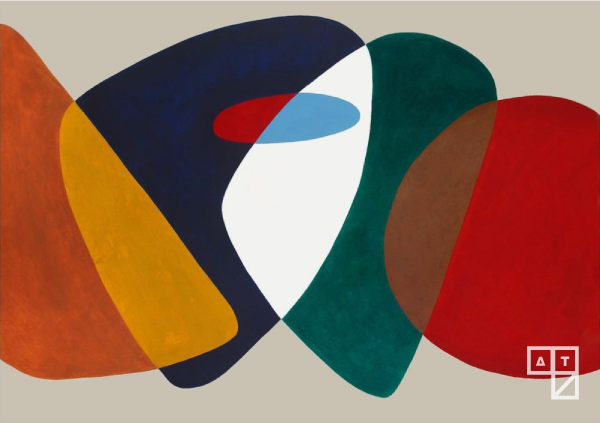
"Recon # 5", acrylic on paper, 2021
How do you think social media affects the art field?
Artists no longer have to wait to be discovered by galleries and the classic art market in order to find an audience and live off their art. So there's a lot of fresh stuff coming out and building its reach this way. So anyone who feels like it and is comfortable with it can use it to find their own way into the arena. Creative collaborations, artist networks and inspiration are further wins. Creating content yourself is then, of course, also part of the job as an artist. You want to be a bit careful that the balance with the artistic work is still right. But the freedom and connectivity of this tool have helped me a lot to get where I am today.
Is there an artistic goal that you would ultimately reach through your work?
As long as there is development and evolution for me, I'm happy.
Is there a new material, genre, or expression technique you want to try?
I want to try out whether more figurative elements would also work for me and in the long term, other substrates and larger formats are also in development. So stay tuned..
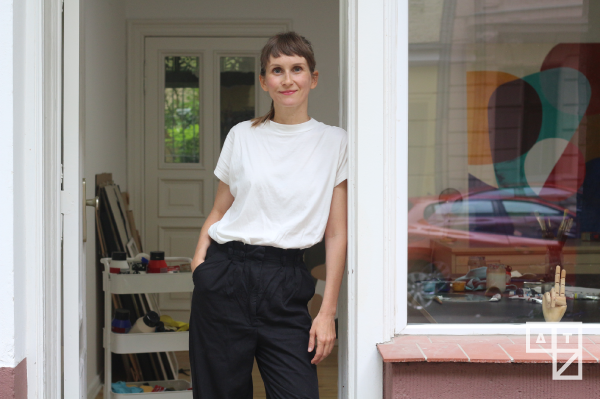
Photo Credit: Wanja Scholz
What kind of artist do you want to be remembered as?
What others think of me is none of my business. ;)
What can we expect from your next works? Could you give us a slight hint?
Vibrancy and warmth.
Thank you so much for taking the time for the interview. Would you like to say something to the readers of Art Terms Magazine?
Stay curious.
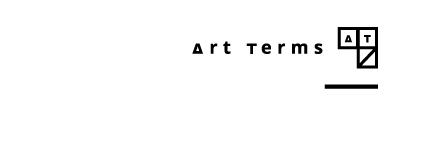
| Prev | [NEWS] The New York Historical Society Announces $140 Million Expansion |
|---|---|
| Next | [NEWS] Kabelo Malatsie to Become First Non-European to Helm Switzerland’s Kunsthalle Bern |
| List |